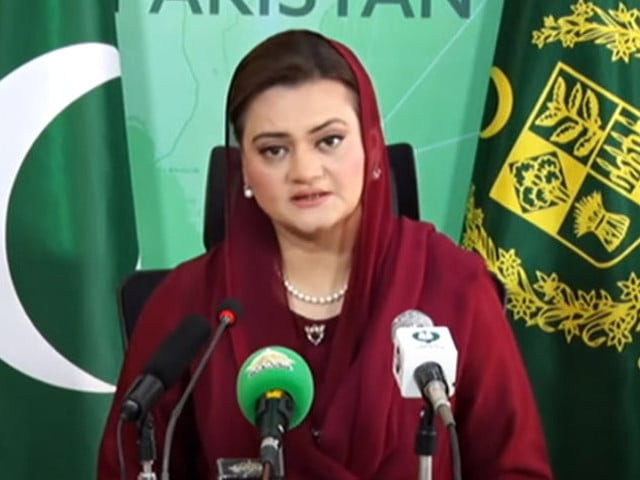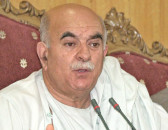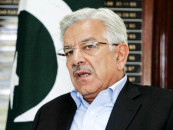Marriyum Aurangzeb: A trailblazer in politics and conservation
Punjab's senior minister driving change through visionary leadership and dedication

Marriyum Aurangzeb, who took oath senior minister in Punjab cabinet earlier in the day, stands as a distinguished figure in Pakistani politics and environmental conservation, recognised for her visionary leadership and steadfast commitment to public service.
With a decade-long tenure at the World Wildlife Fund for Nature-Pakistan (WWF-Pakistan) and a rich political legacy, Aurangzeb has significantly impacted both realms, driving transformative initiatives and fostering positive change.
Political legacy and professional background
Hailing from a family deeply entrenched in Pakistani politics, Marriyum Aurangzeb's journey into public service was inevitable. In 2013, she was elected to the National Assembly as a candidate of the Pakistan Muslim League-Nawaz (PML-N), representing the party's commitment to empowering women in politics.
Building on her mother's legacy as a member of Parliament, Aurangzeb quickly rose through the ranks, leveraging her expertise in strategic thinking and planning.
Aurangzeb's political career is marked by glaring accomplishments and roles of responsibility. She served as the Parliamentary Secretary for Interior and was a member of various standing committees, including those on Climate Change and Information, Broadcasting, and National Heritage.
Notably, she also assumed the role of Chief Organiser of PML-N's Youth Women Wing in Islamabad and Rawalpindi, demonstrating her organisational prowess and commitment to youth empowerment.
In October 2016, Aurangzeb was inducted into the federal cabinet of then prime minister Nawaz Sharif as the Minister of State for Information and Broadcasting.
Read more: Fresh faces dominate Maryam’s cabinet
Her tenure saw remarkable progress and transformative initiatives aimed at revolutionising the media landscape in Pakistan. Following the election of prime minister Shahid Khaqan Abbasi in August 2017, she continued her service as Minister of State for Information, solidifying her reputation as a dynamic and forward-thinking leader.
Contributions as Minister of Information and Broadcasting
During her tenure as Minister of Information and Broadcasting from April 2022 to August 2023, Marriyum Aurangzeb established herself as a high achiever with a vision for the future. She implemented a wide array of innovative projects and policies aimed at promoting media excellence, enhancing public welfare, and advancing Pakistan's cultural heritage.
Media and broadcasting initiatives
Under Aurangzeb's leadership, Pakistan Television (PTV) and Radio Pakistan underwent a remarkable transformation, with the introduction of several groundbreaking initiatives:
Aurangzeb spearheaded the digital migration of Radio Pakistan, ensuring enhanced broadcasting quality and expanded coverage nationwide.
As part of efforts to modernise PTV's offerings, she launched PTV Flix, an OTT platform housing PTV content archives, providing viewers with convenient access to timeless classics and contemporary programming.
Aurangzeb oversaw the expansion of PTV's transmission capabilities, including the establishment of 24/7 PTV National Pashto and Seraiki transmissions, catering to diverse linguistic and cultural audiences across Pakistan.
Aurangzeb's tenure witnessed the establishment of state-of-the-art facilities such as the Chaghi Virtual Studio, equipped with augmented reality technology, and the PTV drama and film academy, nurturing talent and fostering creativity in the Pakistani entertainment industry.
Recognising the importance of environmental conservation, Aurangzeb launched Planet Champs, an animated series aimed at educating children about energy conservation and sustainability, reinforcing Pakistan's commitment to environmental stewardship.
Aurangzeb's initiatives extended beyond television, with the establishment of the National Film Institute and the PTV Film Division, aimed at revitalising Pakistan's film industry and promoting cultural heritage through cinematic excellence.
Engagement with print and electronic media
In addition to her focus on broadcasting, Aurangzeb prioritized engagement with print and electronic media, fostering collaboration and dialogue to amplify the government's message and promote transparency and accountability. Her efforts led to significant improvements in media-government relations, paving the way for constructive discourse and informed decision-making.
Special initiatives and public welfare
Marriyum Aurangzeb's tenure was characterised by a range of special initiatives aimed at promoting public welfare and cultural enrichment.
Recognising the invaluable contributions of journalists and artists, Aurangzeb launched health insurance schemes for these vital segments of society, ensuring their well-being and security.
Aurangzeb's initiatives extended to the cultural sector, with the establishment of the Rs2 billion film and drama finance fund and the PM Health Insurance Scheme for Artists and Artisans, providing financial support and protection to individuals contributing to Pakistan's vibrant cultural landscape.
Aurangzeb's commitment to nurturing talent and creativity was evident in initiatives such as the National Amateur Short Film Festival (NASFF), providing a platform for young filmmakers to showcase their work and contribute to the growth of Pakistan's film industry.
Environmental conservation and advocacy
Marriyum Aurangzeb's passion for environmental conservation has been a driving force throughout her career. Prior to her political endeavours, she dedicated a decade to the World Wildlife Fund for Nature-Pakistan (WWF-Pakistan), where she held various leadership positions and spearheaded global campaigns.
Key achievements with WWF-Pakistan
Aurangzeb played a pivotal role in formulating key environmental and social developmental policies at the global, regional, and national levels, contributing to the advancement of sustainable development goals and environmental conservation efforts.
Aurangzeb's advocacy efforts extended to diverse stakeholders, including the education sector, private sector, and public sector, driving consensus and mobilizing support for environmental causes through innovative campaigns and initiatives.
Aurangzeb's commitment to environmental education was reflected in initiatives to integrate environmental curriculum into formal education systems, raising awareness and fostering a culture of conservation among future generations.
Educational qualifications and academic achievements
Marriyum Aurangzeb's remarkable journey from environmental advocate to political luminary is a testament to her vision, dedication, and unwavering commitment to serving Pakistan and its people.
Through her transformative initiatives in media, broadcasting, and environmental conservation, she has left an indelible mark on the country's social, cultural, and environmental landscape, positioning herself as a trailblazer and a beacon of hope for a brighter, more sustainable future.
Aurangzeb's academic journey is marked by a relentless pursuit of knowledge and excellence, spanning across prestigious institutions both domestically and internationally. Her academic qualifications and achievements underscore her commitment to intellectual rigour and scholarly inquiry.
Master of Science in Environment and Development (King’s College London, London University-UK, Sept. 2003)
Marriyum Aurangzeb's academic odyssey reached new heights with her attainment of a Master of Science in Environment and Development from King’s College London.
Her rigorous curriculum, focused on environmental policy in South Asia, environmental economics, development economics, and environmental and development dynamics, equipped her with a comprehensive understanding of the intricate interplay between environmental sustainability and socio-economic development.
Master of Science in Economics (Quaid-a-Azam University, Islamabad, Pakistan, February 2002)
Complementing her international exposure, Aurangzeb pursued a Master of Science in Economics from Quaid-e-Azam University, Islamabad, Pakistan. With concentrations in economics, development economics, financial markets, international economics, and environmental economics, she honed her analytical prowess and theoretical acumen, laying the groundwork for her subsequent contributions to policy formulation and strategic planning.
Bachelor of Arts (Federal Government College, Islamabad, Pakistan, September 1998)
Aurangzeb's academic journey commenced with her Bachelor of Arts degree from Federal Government College, Islamabad, Pakistan. With a multidisciplinary focus encompassing economics, sociology, and statistics, she cultivated a holistic understanding of societal dynamics and economic phenomena, laying a solid foundation for her future endeavours.
FSc. Premedical (Federal Government College, Islamabad, Pakistan, September 1996)
Prior to her foray into economics and environmental studies, Aurangzeb pursued a premedical track, reflecting her diverse intellectual interests and her commitment to holistic learning. Her concentrations in physics, chemistry, and biology underscore her interdisciplinary approach to education and her capacity for rigorous academic inquiry.
Academic distinctions and scholarships
Marriyum Aurangzeb's academic journey is punctuated by numerous accolades and distinctions, attesting to her intellectual prowess and scholarly contributions.
Read more: Punjab, Khyber-Pakhtunkhwa cabinets sworn in
Aurangzeb's exceptional research abilities were recognised with her attainment of the second position in a research project at King’s College London, underscoring her proficiency in scholarly inquiry and academic rigour.
International professional engagement
Aurangzeb's commitment to professional development and continuous learning is evident in her participation in various training programs, short courses, and international seminars and workshops.
Aurangzeb augmented her expertise in environmental economics through a specialised short course at the South Asian Network for Development Economics in Bangalore, India, reflecting her dedication to staying abreast of emerging trends and best practices in the field.
Aurangzeb's commitment to philanthropy and social development is underscored by her participation in a training workshop on fundraising and proposal writing for NGOs at SDPI in Islamabad, highlighting her proactive approach to addressing societal challenges and fostering sustainable development.
International seminars and workshops
Aurangzeb's active participation in international seminars and workshops underscores her commitment to global collaboration and knowledge exchange. Her engagement with platforms such as the Asia Wetlands Symposium, Environmental Emergencies Rosersberg Initiative on Awareness, and the UN OCCHA Advisory Group on Environmental Emergencies exemplifies her role as a global citizen and a champion of environmental conservation.
Memberships
Aurangzeb's professional affiliations underscore her commitment to fostering collaborative partnerships and driving positive change. Noteworthy memberships include her role as the NGO Focal Person for the Ramsar Secretariat, Geneva, Switzerland, and her executive committee memberships with organizations such as Wetland Link International Asia and the UN OCCHA Advisory Group on Awareness-raising and Advocacy for Environmental Emergencies.
These affiliations reflect Aurangzeb's stature as a respected leader in the international community and her dedication to advancing environmental sustainability and socio-economic development on a global scale.
Publications
Marriyum Aurangzeb's scholarly contributions encompass a diverse array of research papers, publications, and reports that underscore her deep engagement with pressing socio-economic and environmental issues.
Her publications include an insightful examination of the politics surrounding forest management in South Asia, shedding light on the complex dynamics and policy challenges inherent in this critical domain.
Additionally, Aurangzeb has delved into the intricacies of water resource management, offering a comprehensive case study of the Kalabagh Dam in Pakistan and analysing the political constraints and social adaptive capacities at play.
Her comparative study on the role of private NGOs and institutions in policy formulation, juxtaposing Friends of the Earth and the International Union for Conservation of Nature (IUCN), provides valuable insights into the interplay between civil society actors and governmental structures.
Aurangzeb's exploration of ecofeminism's role in mainstreaming sustainable development underscores her interdisciplinary approach to environmental advocacy, while her quantitative analysis of macroeconomic determinants of economic growth and theoretical analysis of budget deficit trends in Pakistan contribute to informed policy discourse and decision-making processes.
Through her rigorous research and scholarly endeavours, Aurangzeb exemplifies a commitment to academic excellence and evidence-based policymaking aimed at fostering sustainable development and societal progress.



















COMMENTS
Comments are moderated and generally will be posted if they are on-topic and not abusive.
For more information, please see our Comments FAQ